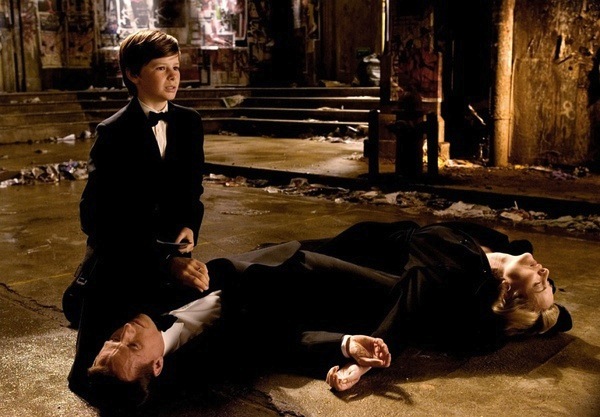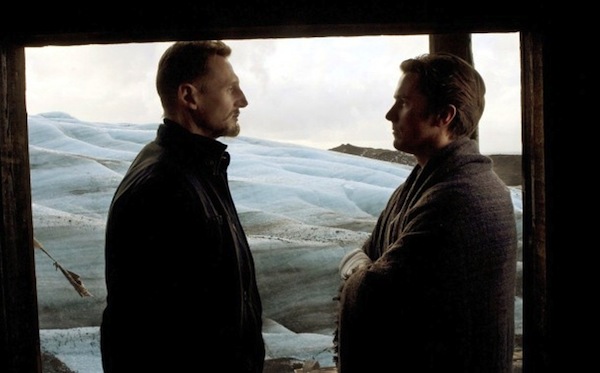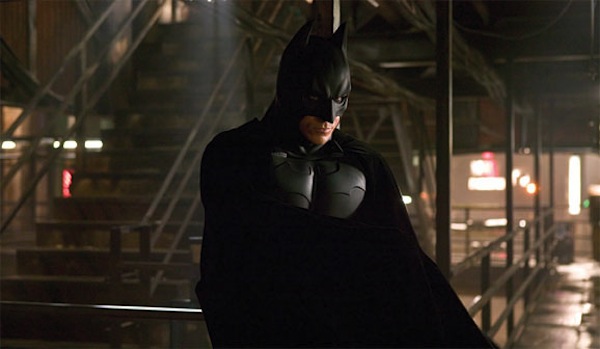With The Dark Knight Rises in theaters this weekend. So begins our five days of Bat-Mas, in which we'll look back at Christopher Nolan's trilogy and forward at its wildly anticipated conclusion. Check out Sam's reflection on Batman Begins below and check back all week for more Bat-ness.
What is it about Batman that makes him so popular? He doesn't have all the powers of Superman, or any powers at all really, save for superhuman levels of dedication to mastering the twin arts of violence and intimidation. Spider-Man is similarly an orphan, but he doesn't let that stop him from cracking jokes.
Batman thinks a punchline is goons filing up in an orderly fashion to get their noses broken. And while Bruce Wayne masquerades as a boozing Lothario to keep his identity a secret, Tony Stark acts like a billionaire playboy because he's a billionaire playboy. On paper, it seems odd that the runt of the superhero litter is the one everybody seems to care about.
 If Superman is our wildest aspirations for what we could be, Batman is as close to a real life Superman as we dare hope could exist. In exploring that truth at the heart of the Batman mythos, Christopher Nolan had to scrape way all the outlandish fringe elements of the comics and previous movies, and returned to audiences the age-old story of a modern man fighting crime, but now honed to a razor's edge.
If Superman is our wildest aspirations for what we could be, Batman is as close to a real life Superman as we dare hope could exist. In exploring that truth at the heart of the Batman mythos, Christopher Nolan had to scrape way all the outlandish fringe elements of the comics and previous movies, and returned to audiences the age-old story of a modern man fighting crime, but now honed to a razor's edge.
The choice has led people to criticize Batman Begins and its equally engrossing follow-up The Dark Knight for being overly serious. Fine. If a superhero movie being more than frivolous spectacle is somehow a bad thing, I'll still trade all the campy performances and nippled-Batsuits out there for a complex protagonist and a well-developed plot featuring strong emotional hooks any day of the week.
Arguing against having a cast filled with incredible actors willing to approach material earnestly and with conviction is like complaining that the chef put too much care and effort into cooking you steak. There's the old saying that someone "was a good Batman, but not a good Bruce Wayne," and vice versa, but Christian Bale, as he did in American Psycho, shows that the two identities are not separate, but really inform a single, deeply damaged whole. And it's the first Batman movie to make the guy in the title the actual star — there's none of that billing Jack Nicholson before Michael Keaton crap here, Bale and Batman are the stars. Using Frank Miller's revolutionary Batman: Year One as a launchpad for the new Batman legend, the death of Bruce Wayne's parents isn't some romantic call-to-arms in a fight against crime, it's the beginning of a lifelong struggle to understand and stop injustice. That drive is given focus under the tutelage of Ducard, an emissary for The League of Shadows played with a fatherly sternness by Liam Neeson. Both he and Bruce share a secret life, and both wish to end the evils of the world, but their means differ drastically.
Using Frank Miller's revolutionary Batman: Year One as a launchpad for the new Batman legend, the death of Bruce Wayne's parents isn't some romantic call-to-arms in a fight against crime, it's the beginning of a lifelong struggle to understand and stop injustice. That drive is given focus under the tutelage of Ducard, an emissary for The League of Shadows played with a fatherly sternness by Liam Neeson. Both he and Bruce share a secret life, and both wish to end the evils of the world, but their means differ drastically.
As Ra's Al Ghul, Ducard would sacrifice the whole of Gotham City to save the world, but as Batman, Wayne devotes himself to saving everyone. A clash of moral relativism and personal ideology makes run-of-the-mill villain plots to get lots of money or blow something up look like the kind of motive only a rich studio with an effects budget would find relatable.
"Training is nothing. Will, is everything, the will to act," Ducard tells Bruce. Other superheroes are made so by accident or birthright, their destiny is spoon-fed to them. Viewers respond to Batman because he creates his powers: his strength, intelligence and skill are all the result of sheer will and determination. Well, it doesn't hurt that he's got the best SkyMall catalogue of gadgets out there, but as with everything else, the toys are routed in spartan efficiency. The old Batmobile would take up half a city block just to park; the Tumbler will roll over every other vehicle and park wherever it damn well pleases. He's Batman, there's no time to find a meter. What makes it so easy to talk at length about the conceptual achievements of Batman Begins is that they all spring out of a flawless base of refined storytelling mechanisms and craft. The plot moves with the momentum of a crime epic, advancing briskly between all the comic book theatrics, while Goyer and Nolan's script is filled with memorable exchanges, even though roughly half of them get reused as ironic zingers. Plus, the film looks incredible (and incredibly real) the whole way through. The production team figured out how to shoot a luminous modern city like Gotham with dread, and didn't have to resort to Tim Burton-style German expressionism overload.
What makes it so easy to talk at length about the conceptual achievements of Batman Begins is that they all spring out of a flawless base of refined storytelling mechanisms and craft. The plot moves with the momentum of a crime epic, advancing briskly between all the comic book theatrics, while Goyer and Nolan's script is filled with memorable exchanges, even though roughly half of them get reused as ironic zingers. Plus, the film looks incredible (and incredibly real) the whole way through. The production team figured out how to shoot a luminous modern city like Gotham with dread, and didn't have to resort to Tim Burton-style German expressionism overload.
Really, frustration with Batman Begins has less to do with the film's own seriousness, and more to do with how seriously other people take it. How this is a bad thing is a mystery. Shouldn't we go into every movie hoping that it can incite such dedication? The film generates more rabid conversation than usual because it was designed to. Nolan plays the long game here, seeding ideas of Batman becoming more than just a man and a movie, while taking the character and franchise to new heights.
Yes, Batman Begins is a really, really great film, but for a lot of people, myself included, it's a reminder that pop culture has the ability to make a lasting impression on you, and become unforgettable. Not bad for a comic book movie, huh?